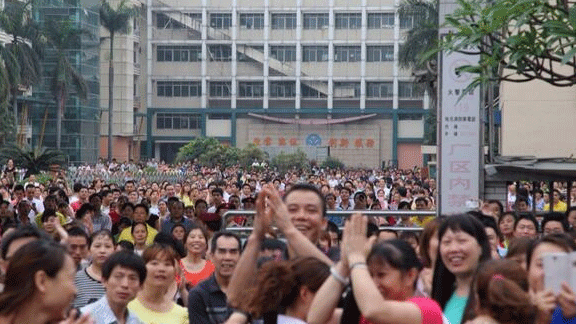Massive strike by Chinese workers

A huge strike began in mid-April at Yue Yuen Industrial shoe factories in Dongguan, China. Labor activists estimated that 40,000 to 60,000 workers joined the strike, making it the largest industrial action in the country in recent years.
Yue Yuen is the biggest manufacturer of sports shoes in the world. Its customers include Nike, Adidas, New Balance, Converse and Puma. Yue Yuen’s consolidated revenue for March was US$650 million. In China, a pair of Nike’s new basketball shoes costs between RMB1399 and 1999 (A$241 to A$344).
However, an assembly line worker receives a monthly salary of about RMB2800 (A$483). Those who produce thousands of shoes every month can’t afford to buy two pairs with a whole month’s pay.
This rate of exploitation doesn’t satisfy the bosses of Yue Yuen, who have also been cheating their workers’ social security fund for 10 years. According to China’s labour law, an employer is required to contribute 14 percent of an employee’s salary to the national social security fund. Yue Yuen pays much less than this. It didn’t pay some workers anything. It is estimated that Yue Yuen has evaded paying RMB300 million into the social security fund every year.
Driven beyond endurance, the workers started to fight back. Small actions such as demonstrations and roadblocks in the town took place from 5 April. On 14 April, three of Yue Yuen’s six factories in Dongguan were shut down. The next day, thousands of workers from the fourth factory broke through a blockade of management and cops and walked out of the workshop. They were greeted by fervent chants and applause from their comrades. Later, about 20,000 workers marched through Dongguan.
At the time of writing, all six factories in Dongguan are shut. Another 2,000 workers in Yue Yuen’s factory in Jiangxi province are striking in solidarity. Labour rights organisations and trade unions in Taiwan and Hong Kong have also rallied to show their support.
The workers’ demands are for a 30 percent wage increase and the payment of the social security arrears. Management offered a pitiful RMB230 RMB (A$40) monthly allowance and claimed that workers should contribute RMB300 per month to repay the social security arrears. In other words, workers need to receive a pay cut to cover the company’s evasion!
Not surprisingly, the local government and its running dogs in the police force are on the side of capital. Hundreds of workers have been beaten and arrested. Moreover, two labour activists were detained by the State Security Agency.
If the Yue Yuen workers win, it will be a great inspiration for others and spark more struggles across the country. The government is mobilising every part of the state apparatus to undermine the strike, and Yue Yuen is shifting some orders to its factories in Vietnam and Indonesia.
Reports suggest that some have returned to work after the company made concessions, but many remain on strike.
[For a follow-up to this article, read “Yue Yuen workers won’t cry”.]